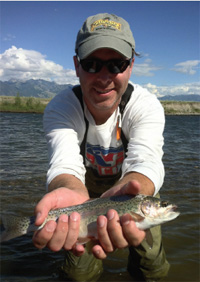
features |
1 > |
 Adam Rix ’98
Adam Rix ’98
DEGREES: B.A., political science; J.D., international water law (University of Denver); M.A., international development (University of Denver)
JOB TITLE: Founder, managing partner, TurningPoint Capital Partners; founder and president of Watermark Initiative, LLC; author of Hydro Perspective; vice chair of the board of directors of Compatible Technology International; member of the Council on Foreign Relations (MN chapter).
FAVORITE TRINITY MEMORY: Serving as an academic mentor during my senior year. I was stationed in North Campus, where I was assigned to a first-year seminar and oversaw 20 students. I was able to serve as a sounding board, teacher, and mentor to these students, and get a second opportunity to see through the eyes of an 18 or 19-year-old what it was like to be opened up to all of the new experiences that college had to offer.
REPORTER: What are Watermark Initiative
and TurningPoint?
RIX: Watermark is a water project and policy
consulting firm that I started in 2002 in my
basement in Denver, Colorado. Most of our clients
early on were located in Africa and Asia.
We built up a pool of experts around the world
—everyone from engineers to anthropologists
—who serve as international consultants on
water projects. These “hydro diplomats” understand
a wide range of subject matter and have
the capacity to be sensitive to multiple stakeholder
groups and understand the needs of different
cultures. My experience with Watermark
Initiative made me realize that we were merely
recommending a particular product, system,
or service that could be implemented in a
project, but that over time I could accomplish
more as a catalyst for change if I became an
investor in water technologies. Because of
this, TurningPoint was launched about two
years ago to focus on the critical gaps that we
saw in the water industry between the investment
community and the innovation needed
to address worldwide water issues. We hunt
for innovations in the water sector and identify
companies that would benefit from our funding,
networking, and “nurturing” resources.
REPORTER: What do you see as important
areas in which to invest, both locally and
globally?
RIX: The United States has critical challenges
with regard to our infrastructure for the delivery
of clean water and processing wastewater.
Numerous municipalities still use a Roman-era
system of central processing and distribution
points serving residential, commercial, and
industrial water users. This system wastes a lot
of energy and takes a lot of raw materials to
build and maintain. Our methods of water distribution
and wastewater collection have been
exported to the mega cities of the developing
world. We see the same problems in places like
Rio de Janeiro or Jakarta as we have in Detroit
and Philadelphia. Addressing infrastructure
sustainability and security in these urban areas
should be a high priority, and it would be wise
for us to adopt technologies that are compatible
and appropriate with urban growth.
At the same time, there simply isn’t enough
water to meet the demands of agriculture
and other industries in developing nations.
Economic growth in Africa and Asia is highly
reliant on mining and extractive industries, and
in these places clean drinking water is going
to uranium, copper, and gold mining before it
goes to growing food or to cities for people
to drink. Because of this, we are at a turning
point where people must prioritize what uses
of water are critical and take advantage of the
water-quality and water-quantity innovations
that are available to help meet demand.
REPORTER: Can you explain the Hydro
Perspective?
RIX: The origins of the Hydro Perspective
go all the way back to my days at Trinity. It
is basically a research analysis tool used by
consultants to assess water issues. When I was
a student at Trinity, I was exposed to the idea
of interconnected systems through courses in
political science and cultural studies. Being a
student of systems, I started to look at water
and water conservation from more than just a scientifi c or legislative angle, but by systematically
assessing political, social, economic, and
cultural capital within a water project. This
four-tiered perspective on water resources
and development has added value to international
and domestic projects, by providing
solutions to water issues related to food, security,
energy, and economic growth.
(continued on next page)
|
| 1 > |
